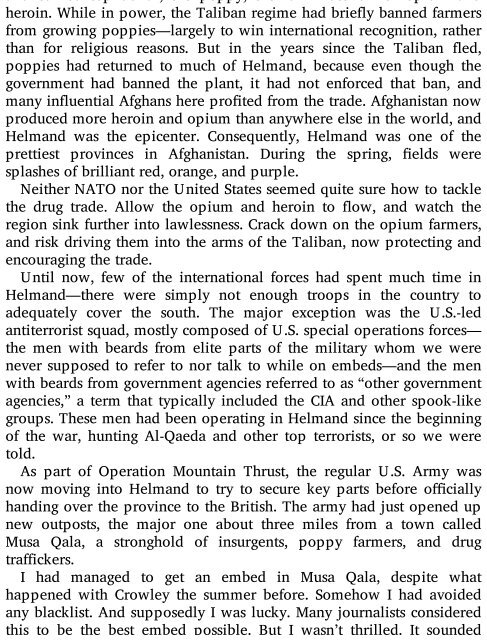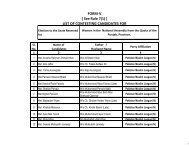the_taliban_shuffle_-_kim_barker
the_taliban_shuffle_-_kim_barker
the_taliban_shuffle_-_kim_barker
You also want an ePaper? Increase the reach of your titles
YUMPU automatically turns print PDFs into web optimized ePapers that Google loves.
heroin. While in power, <strong>the</strong> Taliban regime had briey banned farmers<br />
from growing poppies—largely to win international recognition, ra<strong>the</strong>r<br />
than for religious reasons. But in <strong>the</strong> years since <strong>the</strong> Taliban ed,<br />
poppies had returned to much of Helmand, because even though <strong>the</strong><br />
government had banned <strong>the</strong> plant, it had not enforced that ban, and<br />
many inuential Afghans here proted from <strong>the</strong> trade. Afghanistan now<br />
produced more heroin and opium than anywhere else in <strong>the</strong> world, and<br />
Helmand was <strong>the</strong> epicenter. Consequently, Helmand was one of <strong>the</strong><br />
prettiest provinces in Afghanistan. During <strong>the</strong> spring, elds were<br />
splashes of brilliant red, orange, and purple.<br />
Nei<strong>the</strong>r NATO nor <strong>the</strong> United States seemed quite sure how to tackle<br />
<strong>the</strong> drug trade. Allow <strong>the</strong> opium and heroin to ow, and watch <strong>the</strong><br />
region sink fur<strong>the</strong>r into lawlessness. Crack down on <strong>the</strong> opium farmers,<br />
and risk driving <strong>the</strong>m into <strong>the</strong> arms of <strong>the</strong> Taliban, now protecting and<br />
encouraging <strong>the</strong> trade.<br />
Until now, few of <strong>the</strong> international forces had spent much time in<br />
Helmand—<strong>the</strong>re were simply not enough troops in <strong>the</strong> country to<br />
adequately cover <strong>the</strong> south. The major exception was <strong>the</strong> U.S.-led<br />
antiterrorist squad, mostly composed of U.S. special operations forces—<br />
<strong>the</strong> men with beards from elite parts of <strong>the</strong> military whom we were<br />
never supposed to refer to nor talk to while on embeds—and <strong>the</strong> men<br />
with beards from government agencies referred to as “o<strong>the</strong>r government<br />
agencies,” a term that typically included <strong>the</strong> CIA and o<strong>the</strong>r spook-like<br />
groups. These men had been operating in Helmand since <strong>the</strong> beginning<br />
of <strong>the</strong> war, hunting Al-Qaeda and o<strong>the</strong>r top terrorists, or so we were<br />
told.<br />
As part of Operation Mountain Thrust, <strong>the</strong> regular U.S. Army was<br />
now moving into Helmand to try to secure key parts before ocially<br />
handing over <strong>the</strong> province to <strong>the</strong> British. The army had just opened up<br />
new outposts, <strong>the</strong> major one about three miles from a town called<br />
Musa Qala, a stronghold of insurgents, poppy farmers, and drug<br />
traffickers.<br />
I had managed to get an embed in Musa Qala, despite what<br />
happened with Crowley <strong>the</strong> summer before. Somehow I had avoided<br />
any blacklist. And supposedly I was lucky. Many journalists considered<br />
this to be <strong>the</strong> best embed possible. But I wasn’t thrilled. It sounded



